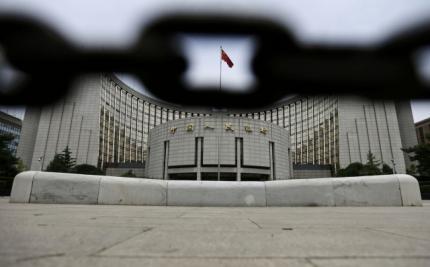Investors look to China and U.S. after ECB fights deflation
Bareksa • 09 Jun 2014

The headquarters of China's central bank, the People's Bank of China - (Reuters/Jason Lee)
Investors will also watch China's urban investment data on Friday
Bareksa.com - This week's light calendar gives investors room to digest the European Central Bank's radical moves to avert deflation and look beyond U.S. data which, in more normal times, might imply higher interest rates.
Global markets will keep an eye on China's investment activity and industrial production, U.S. retail sales, the euro zone's Sentix sentiment index and industrial production as well as UK unemployment figures.
"After all the excitement of last week, the coming week will be much calmer," said Frederic Neum, co-head of Asian Economic Research at HSBC, referring to the ECB's radical plans to fend off deflation and U.S. data showing employment bouncing back to its pre-recession peak in May.
Despite the confirmation that the world's largest economy has bounced back from a winter chill, analysts do not expect the Federal Reserve to switch from pumping billions of dollars into the economy to raising interest rates until well into next year.
A major focus will be U.S. May retail sales on Thursday, expected to rise 0.6 percent on the month after slowing sharply to 0.1 percent in April from strong gains in the prior two months.
Friday's producer prices data for May, a proxy for consumer inflation, will shed some light on whether a second quarter acceleration in the U.S. economy is feeding inflation.
Analysts are looking to China's May industrial output measure, due on Friday, for some reassurance that the world's second largest economy is regaining momentum. The consensus forecast is for 8.8 percent growth on the year, up from 8.7 percent.
"China, after all, has been the engine of global growth for the past decade, and its recent sputtering has caused jitters among investors. Soothing data from China is just what investors need at the moment," Neum said.
Investors will also watch China's urban investment data on Friday. Growth is predicted to slow to 17.1 percent year-on-year in May from 17.3 percent in April.
"An increasing headwind is coming from investment in real estate due to accumulated oversupply as well as manufacturing due to efforts to slash overcapacity," UniCredit wrote in its weekly focus.
ECB GIVES EURO ZONE BREATHING SPACE, FOR NOW
The 9.5 trillion euro ($13 trillion) economy of the 18 countries sharing the euro grew much more slowly than expected at the beginning of the year and analysts warned it could slow further in the second quarter.
The ECB cut rates on Thursday and will pump in money in an effort to steer the bloc away from the economic quicksand of deflation, promising to do more if all this is not enough.
After the bank deployed pretty much every measure it had left, bar printing money, the question is if and when quantitative easing becomes a live possibility. There is, however, a high bar for such an action.
"If we see a sort of vicious circle emerge out of (low) inflation and an unanchoring of expectations and an outward shock that would create a reverse spiral, that would require a broad programme of asset purchases," ECB Vice President Vitor Constancio said on Friday.
The bloc's retail sales data for April hit a seven-year high and investors anticipate that Thursday's industrial production data for that month will show output returning to growth on both on a monthly and annual basis.
June's reading of euro zone investor sentiment on Monday is predicted to tick up again after slipping in May from April's three-year high.
CENTRAL BANK WATCH
Japan's central bank holds a two-day policy review, ending June 13. It is likely to maintain its current massive monetary stimulus but stick to its upbeat view on the economy and prices.
Investors will scour Governor Haruhiko Kuroda's words for clues as expectations for fresh monetary stimulus recede near-term. Policymakers and private-sector economists see the economy as able to weather temporary pain from the sales tax hike that took effect on April 1.
The Mansion House dinner in London, one of Britain's biggest set-pieces of the year, will give Bank of England Governor Mark Carney a chance on Thursday to comment on how to calm housing market hot spots, notably London. The International Monetary Fund has urged Britain to cool its housing market by reining in risky mortgages.
The UK unemployment rate on June 11 is forecast to ease to 6.7 percent in April from 6.8 percent in March, feeding speculation about how soon interest rates will rise, while several members of the ECB's Governing Council will be commenting on local economies and the latest policy package.
Iceland's central bank announces its rate decision on Wednesday, followed by New Zealand on Thursday. ($1 = 0.7345 Euros)
(Source : Reuters)